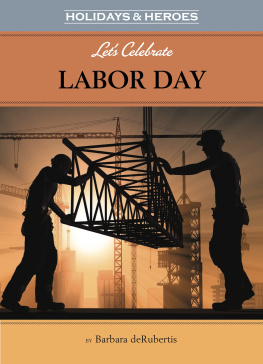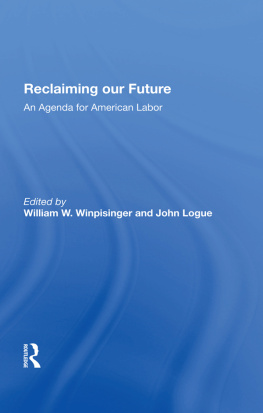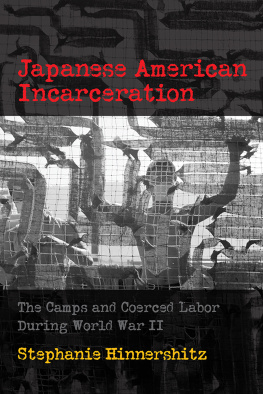American Federation of Labor. - Commonsense anticommunism: labor and civil liberties between the world wars
Here you can read online American Federation of Labor. - Commonsense anticommunism: labor and civil liberties between the world wars full text of the book (entire story) in english for free. Download pdf and epub, get meaning, cover and reviews about this ebook. City: United States, year: 2012, publisher: The University of North Carolina Press, genre: Politics. Description of the work, (preface) as well as reviews are available. Best literature library LitArk.com created for fans of good reading and offers a wide selection of genres:
Romance novel
Science fiction
Adventure
Detective
Science
History
Home and family
Prose
Art
Politics
Computer
Non-fiction
Religion
Business
Children
Humor
Choose a favorite category and find really read worthwhile books. Enjoy immersion in the world of imagination, feel the emotions of the characters or learn something new for yourself, make an fascinating discovery.

- Book:Commonsense anticommunism: labor and civil liberties between the world wars
- Author:
- Publisher:The University of North Carolina Press
- Genre:
- Year:2012
- City:United States
- Rating:3 / 5
- Favourites:Add to favourites
- Your mark:
- 60
- 1
- 2
- 3
- 4
- 5
Commonsense anticommunism: labor and civil liberties between the world wars: summary, description and annotation
We offer to read an annotation, description, summary or preface (depends on what the author of the book "Commonsense anticommunism: labor and civil liberties between the world wars" wrote himself). If you haven't found the necessary information about the book — write in the comments, we will try to find it.
Commonsense anticommunism: labor and civil liberties between the world wars — read online for free the complete book (whole text) full work
Below is the text of the book, divided by pages. System saving the place of the last page read, allows you to conveniently read the book "Commonsense anticommunism: labor and civil liberties between the world wars" online for free, without having to search again every time where you left off. Put a bookmark, and you can go to the page where you finished reading at any time.
Font size:
Interval:
Bookmark:
Commonsense Anticommunism
2012 The University of North Carolina Press
All rights reserved
Set in Minion by Tseng Information Systems, Inc.
Manufactured in the United States of America
 The paper in this book meets the guidelines for permanence and durability of the Committee on Production Guidelines for Book Longevity of the Council on Library Resources.
The paper in this book meets the guidelines for permanence and durability of the Committee on Production Guidelines for Book Longevity of the Council on Library Resources.
The University of North Carolina Press has been a member of the Green Press Initiative since 2003.
Library of Congress Cataloging-in-Publication Data
Luff, Jennifer.
Commonsense anticommunism : labor and civil
liberties between the world wars / Jennifer Luff. 1st ed.
p. cm.
Includes bibliographical references and index.
ISBN 978-0-8078-3541-8 (cloth : alk. paper)
1. CommunismUnited States. 2. United StatesPolitics
and government19011953. 3. Anti-communist movements
United States. 4. McCarthy, Joseph, 19081957. 5. American
Federation of Labor. I. Title.
HX89.L84 2012
335.43097309041dc23
2011044464
16 15 14 13 12 5 4 3 2 1
Here Puss, Puss!
Assorted Cargo for the Return Trip
William J. Burns
Harry M. Daugherty
J. Edgar Hoover
Welcome card, AFL convention, 1937
Measuring the Results of the Latest Peace Efforts
Martin Dies
John P. Frey and Howard Smith
Russia in the making!
Roy Rosenzweig convinced me to write this book. As a new Ph.D., I taught a survey class as an adjunct at George Mason University, and met Roy in early 2006. He asked me to visit one of his graduate courses to talk about dissertation writing, and his unaffected kindness immediately put me at ease. Roy insisted on driving me home, a long drive from Fairfax, Virginia, to Washington, D.C., and his warmth loosened my tongue. In class he had already heard about my dissertation on labor spies. Now he listened intently as I told him about the fascinating clues I had found about labor anticommunism. I confessed that I wanted to put aside my dissertation and work on this new project instead. Go ahead! he said. Its a great project! I had not realized that Roy was a member of the editorial board of the journal American Communist History, and he knew a lot about Communism and anticommunism. The car periodically drifted across the freeway lanes as we gossiped about labor conservatives and Communists. Send me your research, he urged as he dropped me off, and I promised to do so, suddenly resolved to start the book. Roy Rosenzweig died the following year. As one of untold scholars who benefited from his encouragement, I want to say thanks to Roy Rosenzweig.
Generous funding made my research possible. A postdoctoral fellowship from the Center for the United States and the Cold War at New York Universitys Tamiment Library gave me a glorious year in the archives and access to the remarkable librarians and holdings of the Tamiment. Thanks especially to Michael Nash and Peter Filardo for their support and advice. A second postdoctoral fellowship year at UCLAs Institute for Research on Labor and Employment (IRLE) allowed me to draft the manuscript in a stimulating and nurturing environment. At the IRLE, Ruth Milkman created an extraordinarily warm scholarly climate and helped me test and develop my ideas. A short-term fellowship at the Newberry Library introduced me to its friendly community of scholars and especially James Grossman, who is a model of collegiality.
Many librarians and archivists tracked down documents and helped me interpret my findings. I am especially grateful to Peter Filardo at the Tamiment Library; Jim Quigel at Penn States Historical Collections and Labor Archives; Sarah Springer and Robert Reynolds at the George Meany Archives; Patrizia Sione and Barb Morley at Cornells Kheel Center; and Traci Drummond of Special Collections and Archives, Georgia State University. Darlene Mott at the Sam Houston Regional Library and Research Center and Aaron Lisec at the Southern Illinois Universitys Special Collections found important materials for me. Rod Ross at the National Archives Center for Legislative Archives spent time helping me navigate the papers of congressional committees. John Earl Haynes graciously helped me with the John Frey papers at the Library of Congress, and a visit to San Francisco State Universitys Labor Archives and Research Center was productive and fun thanks to Catherine Powell. A special thanks to Peter Drinkwater at Footnote.com, the digital repository of several collections of the National Archives. When I complained about difficulty navigating the huge Franz von Rintelen file in the Department of Justice papers, Peter burned a CD of the entire file for me. The interlibrary loan service at Georgetown Universitys Lauinger Library supplied me with obscure materials quickly and efficiently.
It has been wonderful to work with the staff at the University of North Carolina Press. Chuck Grench supported this project in its earliest stages, and his encouragement sustained my resolve through the long writing process. The good cheer of Beth Lassiter, Rachel Berry Surles, and Katy OBrien made the editorial process fun. Paul Betz and Liz Grays painstaking work on the manuscript enabled me to produce a much better book.
Many people read and critiqued chapters of the manuscript in seminars and colloquia. Writing groups in New York and Los Angeles helped me puzzle through the earliest drafts. In New York, Jonathan Soffer, Nancy Kwak, Sarah Phillips, Anne Kornhauser, Richard Greenwald, and Neil Rosendorf gave me invaluable comments and advice, along with plenty of good cheese from Murrays. In Los Angeles, the long-running Los Angeles Social History Study Group welcomed me to their convivial dinners and rigorous discussions; thanks to John Laslett, Becky Nicolaides, Steve Ross, Frank Stricker, Allison Varzally, Toby Higbie, Hal Barron, Nancy Fitch, Leila Zenderland, and Craig Loftin. Beverly Gage and Donna Haverty-Stacke generously read and critiqued chapters, and I am indebted to them for their insightful comments and suggestions.
Discussions and debates with other scholars and friends helped me sharpen my ideas. Gabe Kramers comments on an early draft of the book proposal have shaped my thinking throughout the entire process of research and writing. Thanks especially to Toby Higbie, Anthony Destefanis, David Chu, Rich Yeselson, Patrick Iber, Christine Walker, Robin Veder, Katie Corrigan, Sandy Jacoby, Nancy Maclean, Ruth Milkman, Leon Fink, Seth Newton Patel, Donna Haverty-Stacke, and Kim Phillips-Fein. Ruth Price shared her vast knowledge of American radicalism and antiradicalism, and sent me the announcement for the Tamiment fellowship, right after my inspirational conversation with Roy Rosenzweig. I am grateful to readers at the Newberry Seminar in Labor History, the Tamiment Library, the U.S. History Colloquium at UCLA, and the Pennsylvania Labor History Workshop, especially Rosemary Feurer, Colleen Doody, Ellen Carol DuBois, Will Jones, David Montgomery, and David Witwer. Conference audiences and commentators provided helpful comments at the American Studies Association, the American Historical Association, the North American Labor History Conference, the Policy History Conference, and the University of Arizonas Decentering Cold War History conference. A visiting teaching post in the Student Recommended Faculty Program at the University of California, Irvine, allowed me to try out some of my research in the classroom. Thanks to my students at Irvine and colleagues in the history department there; thanks also to my students at Georgetown University, who discussed some of these ideas as well.
Friends and family gave me places to stay on research trips, shared dinners and drinks, and lent a friendly ear. Thanks to Ed Keyser, Janet Mitchell, Sam Luebke, Traci Zambotti, Philip Giordano, Robin Veder, Vanessa White, Katerina Semyonova, Emily Mieras, Scott Zdrazil, David Miller, Rebecca Hanson, Cathy Feingold, Susan Dundon, Eric Perkins, George Boas, Shari Nutter, Kim Armbrecht, Chris Bohner, and Pilar Weiss. It is a pleasure and honor to work with my colleagues at Georgetowns Kalmanovitz Initiative for Labor and the Working Poor: Joe McCartin, Katie Corrigan, Seth Newton Patel, Sarah David Heydemann, and John Tremblay. My parents, Diane Luff and Dick Luff, taught me to love books and learning. Christine Walker, my sister, moved me in and out of various apartments, talked through my research, and gave me refresher history lessons along the way. My brother, Thomas Luff, inspired me with his wisdom and grace and gave me hope. Thanks also to my extended family of in-laws, cousins, and aunts and uncles who cheered me on and buoyed my spirits.
Font size:
Interval:
Bookmark:
Similar books «Commonsense anticommunism: labor and civil liberties between the world wars»
Look at similar books to Commonsense anticommunism: labor and civil liberties between the world wars. We have selected literature similar in name and meaning in the hope of providing readers with more options to find new, interesting, not yet read works.
Discussion, reviews of the book Commonsense anticommunism: labor and civil liberties between the world wars and just readers' own opinions. Leave your comments, write what you think about the work, its meaning or the main characters. Specify what exactly you liked and what you didn't like, and why you think so.



